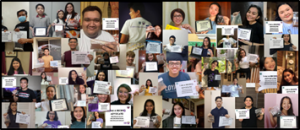Integral to healthcare are medicines that are used for the diagnosis, prevention, and treatment of diseases. The accessibility of medicines make it possible for people to get hold of medication through a simple trip to their local pharmacy. Though accessibility of medicines is seen as a benefit, the improper disposal poses risks of accidental or intentional poisoning. Even greater is the threat it poses to the environment. Thus, their proper disposal must be ensured and the most effective way to dispose of them is through medicine take-back initiatives.


The UST Faculty of Pharmacy, through the leadership of their Dean, Prof. Aleth Therese L. Dacanay, launched a medicine take-back program that aims to propagate necessary knowledge for safe medicine disposal and to provide an avenue where unused, unwanted, and expired medicines can be disposed of.
The Faculty marked a milestone in the practice of Pharmacy by launching the first-ever medicine take-back initiative in the country. Recipio, a Latin word for “recover” or “take-back”, is a program borne out of the vision of Dean Dacanay as a response to medication stewardship as it stepped up to initiate and institutionalize a university-wide medicine take-back program. During its launch, the whole Thomasian community was engaged through the medicine take-back booths that were set-up in every building on campus. A lecture on the importance and best practices of medicine disposal was conducted for both students and faculty. The lecture emphasized the negative impacts of improperly disposed medicines focusing on diversion of use and emphasizing the concept of pharmaceutical pollution.
Now, in the new normal, Recipio’s initiatives still thrive despite the restrictions brought about by the pandemic as it focuses on its health education and promotion programs. Through the Social and Administrative Pharmacy course, a week-long Recipio Online Caravan was conducted and was able to reach 2,100 households. Topics discussed in the online caravan were the basics of medicines, including their storage and proper disposal. The latter part of 2021 marked another milestone for Recipio as another round of online events were held coinciding with the National Environmental Month. A webinar titled “The Trash Talk” was held to rally the faculty towards active involvement in the program. It featured the university’s waste disposal practices. The webinar also highlighted perspectives from department representatives in the Faculty on how their disciplines can contribute to reducing waste and becoming stewards of the environment.
Recipio’s thrust is further defined as it draws inspiration from the concepts adapted in the Laudato si. With environmental stewardship as one of the goals of the medicine take-back program, the organizers of Recipio also envisioned this program to champion advancements in health education and promotion and social responsibility. Looking ahead, partnerships with recognized organizations are also in the future of Recipio to further propel its advocacy. It is the dream of Recipio that the creation of a national policy on medicine disposal will happen. With its newfound direction, Recipio is truly set “in caring for people and the environment.”




